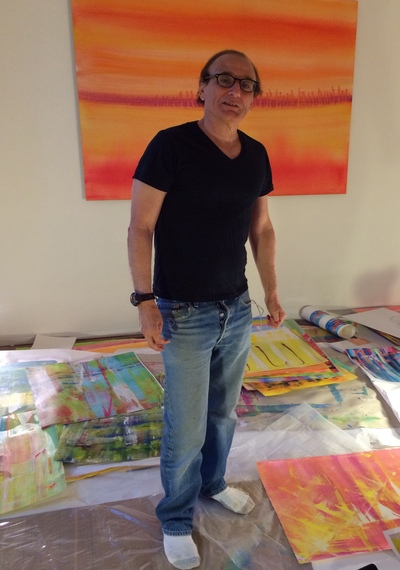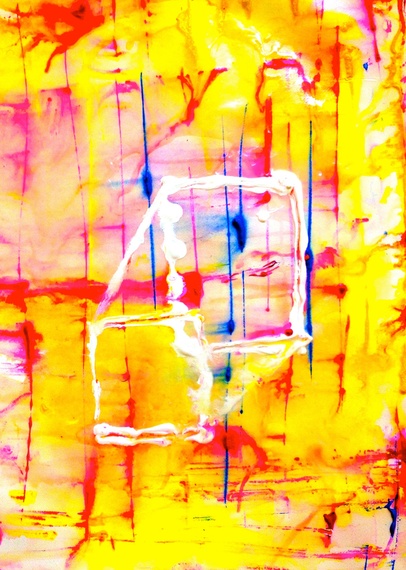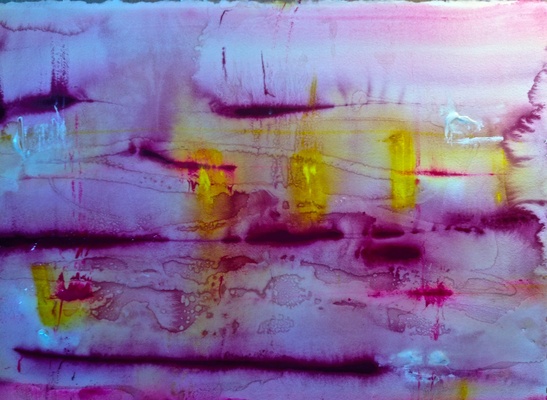When recently introduced to William Witenberg by a kind young art enthusiast, she simply said, "Malcolm I want you to meet my friend William, he is in finance and he's also an artist." While there was absolutely nothing untoward in this introduction, I won't pretend that I didn't involuntarily roll my eyes and think to myself, "Great, another Jeff Koons."
I don't know why, but whenever I hear of a guy leaving finance and pivoting into the art world, I immediately and foolishly think of Jeff Koons. Well, I really didn't have time to go into a deep and profound psychological examination of my snap judgment; instead, I began plotting my escape route to prevent this conversation from going any further. Luckily, I remembered a lesson my mother taught me many years ago, "It doesn't cost you anything to be kind and gracious while listening to someone's story." In hindsight, I'm very lucky this one childhood lesson stuck with me -- if not, I would have never had the opportunity to view and experience artist William Witenberg's magical and inspiring work.
Describe your transition from the finance industry into art world?
I have been an artist since college. Buckminster Fuller actually gave me the title "artist" when I tie-dyed canvas on a geodesic dome. After college, I needed a job and Wall Street drew me in. I worked as a person of commerce, while in my nonworking time I wandered the museums and galleries of New York. I also needed to support my growing family and engaged in finance as a profession but continued to create art. In effect, I have painted my entire life but at some point in life an inner force dictated that I could not be effective as an artist unless I spent all my time concentrating on my art. I now spend all my time and energy embracing my creative side. My Wall Street experience gave me a familiarity with technology so it is not surprising that I recently began to use technology to develop my paintings more than I could have otherwise.
First and perhaps the most annoying question: How would you describe your aesthetic?
My aesthetic is not stationary but ever evolving. I am focused on relationships between compositions, materials, colors, shapes and/or images in art. I am especially interested in layers. When creating a work of art, I am first drawn into a piece by the relationships of the colors, then subsequently this triggers an emotional response in me. I try to replicate that visceral response for the viewer.
When did you know you were an artist?
I have always loved art as a child. I did not begin making art until I was on the West Coast, and was inspired by the light there. But I did not consider myself an artist until Buckminster Fuller complimented my tie dying of one his geodesic domes, he said he I was an artist.
Can you describe your process without giving away all its magical secrets?
I always begin with a plan. I test colors ahead of time, I lay out much of the painting. In terms of my current work exploring the way viewers today interact with technology, I will alter the pieces using various imaging technologies. But I like to preserve the mystery of it, so I won't go into any more.
When or how do you know that a piece is finished and it's time to step away?
It is harder than one would think but I try to step away once I feel I have gotten the intended visceral response.
Would you consider yourself a perfectionist or accidentalist in terms of your practice? And yes, I just made up a new word accidentalist.
You can tell that it is a good word to have made up since its meaning is apparent. I am both. I try to create perfection with the random events that are inevitable with many of the mediums I use (watercolor, resin, polycyclic). With recent addition of technology I am a perfectionist in the sense I can develop the "accidents' into what I would like.
Is there a time of day that you feel most creative or inspired?
I only paint during daylight. I prefer the mornings and early afternoon.
Do you ever show people or collectors your work when it's in process or do you wait until it's finished?
I do show ideas or beginning of work to people. I have always been interested in the comments of other people.
How important is failure to your artistic process?
Extremely important. I learn from failure. Knowing what not to do is as important as knowing what to do.
To what degree is your work pre-planned or considered and to what degree does it manifest itself as you're working?
My recent work is a combination. I pre-plan and then inevitably the reality is different. However when I use image editing technology, I feel there is more control and hence pre-planning plays a larger role.
Can you recall the first piece of art you ever made and sold?
The first piece I ever sold was a watercolor that was called "Those Romantic Young Boys" it was an abstract depiction of the Crucifixion of Christ.
What was the last great piece of advice you received in regards to your practice, and from whom?
"Keep doing what you are doing. You are onto something." Klaus Ottmann, Curator at large The Phillips Collection
How do you handle criticism or accept advice when it comes to your work?
I welcome it. I need both advice and criticism. I may ignore but I will always listen and think
Would you say that your art making is ritualistic - is there a standardized process you follow when producing work, or does it vary from piece to piece?
It varies on the piece. I sometimes have a thought in the middle of the night and have to address it in the morning and skip the preparation stage and other times I am at a loss at what to do.
If you ever feel creatively blocked, what do you do to overcome it?
New York City is the easiest place to overcome a creative block. The streets are filled with colors, people, art, and ideas. I just increase my attention to what is around me on the streets and I am no longer blocked.
In what ways has your practice changed/evolved/improved in the time since you first started? Is it still changing?
Yes I am ever changing. I first focused on just watercolors on paper . I did minimalist work. For example: three lines of color on arches paper. Recently I am painting and then using image editing software, and I am already planning a new area of exploration for my work.
Can your recall a definitive moment or turning point in your career - perhaps a specific show or the realization of a new method or process?
Without a doubt when Gerhard Richter had a show at Goodman Gallery and Wade Guyton had his work shown at the Whitney around the same time I realized that in order for technology to have a visceral connection with the viewer it was important that the human hand was involved.
What would you like for the definitive take away to be when someone experiences or views your work?
I would like for the painting to communicate to the viewer at an emotional level.
- - -
So, to answer my earlier question: Does the Art World need another Jeff Koons? Clearly, the answer is a big fat NO. Luckily Mr. Witenberg has found a way to seamlessly re-enter the art world by marrying technology and art with a little financial know-how to assure he can continue creating his joyous and sublime techno-masterpieces.
@all photos courtesy of www.williamwitenberg.com



